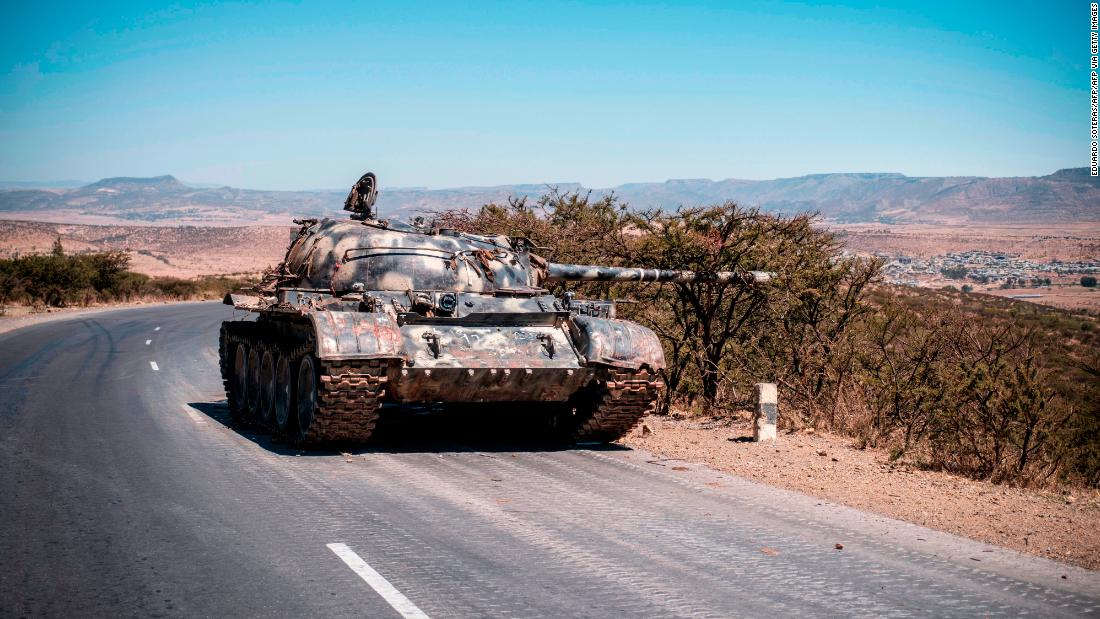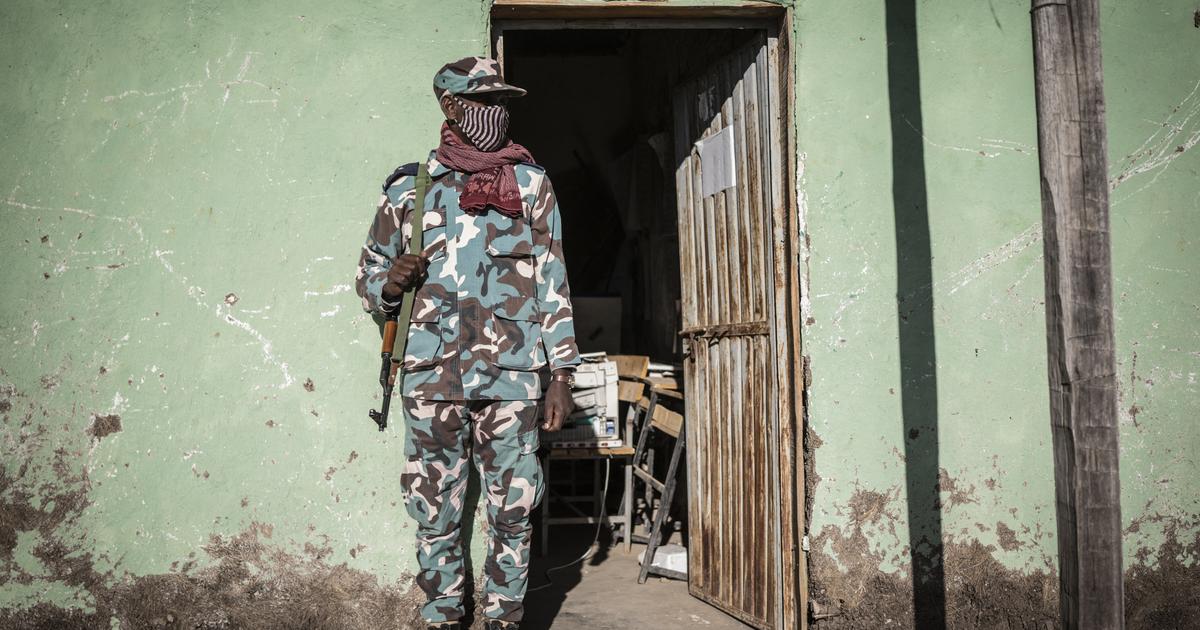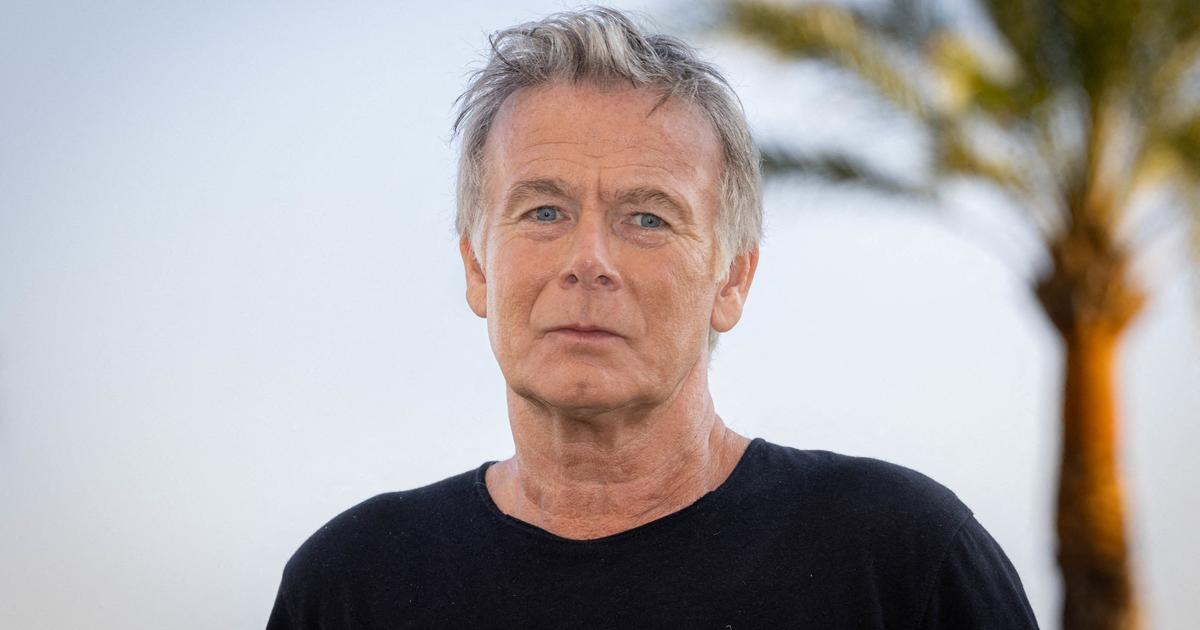(CNN) -
When Ethiopia's Prime Minister Abiy Ahmed received the Nobel Peace Prize in 2019, he was lauded as a regional peacemaker.
Now, he remains in power in the context of a protracted civil war that, according to many testimonies, bears the stamp of genocide and has the potential to destabilize the wider region of the Horn of Africa.
In November 2020, Abiy ordered a military offensive in the northern region of Tigray and promised that the conflict would be resolved quickly.
A year later, the fighting has left thousands dead, displaced more than two million people from their homes, fueled famine and sparked a wave of atrocities.
The UN condemns the atrocities carried out in the Tigray conflict, while Ethiopia announces the state of emergency
Ethiopia faced significant economic, ethnic and political challenges long before a dispute between Abiy and the region's former ruling party, the Tigray People's Liberation Front (TPLF), escalated into unrest.
But now, with hostilities escalating elsewhere in Ethiopia, fears are growing that the fighting in Tigray could trigger a broader crisis with the potential to disintegrate Africa's second most populous country.
Here is a more detailed analysis of the ongoing conflict in Ethiopia.
advertising
How it all started?
The Tigray conflict is rooted in tensions dating back several generations in Ethiopia's past.
An Ethiopian refugee prays in an Orthodox church near a refugee camp in Gedaref, eastern Sudan, on December 6, 2020.
The country is made up of 10 regions - and two cities - that enjoy great autonomy, including the ability to have regional police and militia.
Due to a previous conflict with neighboring Eritrea, there are also a large number of federal troops in Tigray.
Regional governments are largely divided along entrenched ethnic lines.
Before Abiy Ahmed came to power, the TPLF had ruled Ethiopia with an iron fist for decades, overseeing a period of stability and economic growth at the cost of basic civil and political rights.
This authoritarian government sparked a popular uprising that eventually forced Abiy's predecessor, Hailemariam Desalegn, to resign.
In 2018, Abiy was appointed by the ruling class to quell tensions and bring about change, without jeopardizing the old political order.
But almost as soon as he became prime minister, Abiy announced the reorganization of the ruling coalition that the TPLF had founded - the Ethiopian People's Revolutionary Front (EPRDF), made up of four parties - into a single new Prosperity Party, ostracizing the TPLF in the process.
By pushing for a new pan-Ethiopian political party, Abiy made some regions fear that the country's federal system - which guarantees significant autonomy to ethnically defined states like Tigray - would be threatened.
Tigray's leaders withdrew to the mountainous sector in the north of the region, where they continued to control their own regional government.
Tensions reached a fever pitch in September 2020, when the Tigrinos challenged Abiy by moving forward with the regional parliamentary elections that he had postponed due to the coronavirus pandemic.
Abiy called the vote illegal and lawmakers cut funding to TPLF leaders, triggering a series of escalations between the regional and federal governments.
Ethiopia used its commercial flag carrier to transport weapons during the war in Tigray
On November 4, 2020, after accusing the TPLF of attacking a federal army base on the outskirts of Mekelle, the regional capital of Tigray, and attempting to steal its weapons, Abiy ordered a military assault on the group, sending national troops and fighters. from the neighboring Amhara region, along with Eritrean soldiers.
A damaged tank on a road north of Mekelle, capital of Tigray, on February 26
Abiy declared that the offensive had been a success after just three weeks, when government forces seized Mekelle and installed an interim administration loyal to the central government in Addis Ababa.
But a year later, the situation is far from over.
What atrocities have been committed?
For months, Abiy denied that civilians were being harmed or that Eritrean soldiers had joined the fight.
But reports from international observers, human rights groups and CNN proved both claims to be false.
By many estimates, thousands of people have been killed in the fighting, and there are reports of refugee camps razed, looting, sexual violence, massacres and extrajudicial executions.
Many more have fled to Sudan, in what the United Nations has called the worst exodus of refugees from Ethiopia seen in two decades.
They describe a disastrous conflict that has resulted in ethnic violence.
The Ethiopian government has severely restricted access to journalists, and a state-imposed communications blackout has obscured events in the region, making it difficult to measure the extent of the crisis or verify the accounts of survivors. .
Tigrinos cry next to a mass grave in the city of Wukro, north of Mekele, on February 28, 2021. (Credit: EDUARDO SOTERAS / AFP via Getty Images)
But evidence of the atrocities began to leak out earlier this year.
Separate investigations by CNN and Amnesty International in February uncovered evidence of massacres carried out by Eritrean forces in the Tiger cities of Dengelat and Axum late last year.
Another CNN investigation published in June revealed new details of a massacre committed by Ethiopian soldiers in the Tiger town of Mahibere Dego in January.
The report identified one of the perpetrators of the massacre and geolocated human remains at the scene of the attack.
In an exclusive report from Tigray in April, CNN captured Eritrean troops - some disguised in old Ethiopian military uniforms - operating with impunity in central Tigray, occupying checkpoints and blocking vital humanitarian aid to starving populations for more than a month. after Abiy promised the international community that they would leave.
CNN discovers evidence of torture at Tigray 8:46
All actors in the conflict have been accused of committing atrocities, but Eritrean forces have been linked to some of the most gruesome.
In addition to mass murder and rape, Eritrean soldiers have also been found blocking and looting food aid in multiple parts of Tigray.
The Eritrean government has denied any involvement in the atrocities.
The Ethiopian government is committed to investigating any crime.
The conflict, which erupted during the fall harvest season after Ethiopia's worst desert locust invasion in decades, plunged Tigray further into serious food insecurity.
Massacre in Ethiopia: dozens of civilians killed 3:56
In September, the UN claimed that a "de facto blockade of humanitarian aid" limited its ability to access more than 5 million people in Tigray - 90% of the population - in need of humanitarian aid, including 400,000 people who were facing to famine conditions.
That same month, UN aid chief Martin Griffiths declared that swaths of the war-torn region were mired in a "man-made" famine and urged the Ethiopian government to facilitate access.
The Ethiopian government has repeatedly rejected allegations that it is blocking aid.
Within days of Griffiths' comments, Ethiopia ordered the expulsion from the country of seven senior UN officials, including those from organizations coordinating relief efforts.
Why did Abiy win the Nobel Peace Prize?
Less than a year before Abiy launched an attack on his own people, he described the war as "the epitome of hell" during his acceptance speech for the Nobel Peace Prize.
He was awarded the award for his role in ending a long conflict with neighboring Eritrea and for pushing for major reforms in Ethiopia.
Ethiopian Prime Minister Abiy Ahmed campaigns in Jimma on June 16, 2021.
Eritrea was part of Ethiopia, but became independent in 1993 after 30 years of armed struggle.
Between 1998 and 2000, Ethiopia and Eritrea fought a war in which thousands of people on both sides were killed, leading to a long and dangerous stalemate and a total freeze in cooperation.
Once in power, Abiy was quick to normalize relations with Eritrea, in part accepting the opinion of an international commission on the borders between the two states.
Abiy also took significant steps toward internal reforms, raising hopes that he would achieve lasting change.
In addition to forging a truce with Eritrea, he lifted a harsh security law, released thousands of political prisoners, mobilized to open up the telecommunications industry and expand private investment.
But his reputation as a leader capable of uniting Ethiopia has rapidly deteriorated, and his much-lauded peace deal with Eritrea appears to have paved the way for the two countries to go to war with their mutual enemy, the TPLF.
Since the conflict began, ethnic violence has erupted in other parts of the country, including Abiy's home region, Oromia, the most populous in the country.
In May, the armed group Oromo Liberation Army (OLA) promised to wage "all-out war" against the Abiy government.
Ethiopia used flag carrier to move weapons 4:21
Despite promises to eliminate ethnic divisions and pave the way for a peaceful and democratic transition, Abiy has increasingly invoked the playbook of repressive regimes: it shut down internet and phone services, detained journalists and cracked down on the critics.
Abiy has also been criticized for fueling "inflamed" rhetoric amid the Tigray conflict, whose forces he has described as "weed" and "cancer."
Last July, in the midst of the war, Abiy and his party won a landslide victory in a general election that was boycotted by opposition parties, marred by logistical problems and excluded many voters, including all those from Tigray, a crushing disappointment to many who had high hopes for the democratic transition that Abiy promised three years ago would come true.
What happens now?
The Ethiopian government declared a unilateral ceasefire in June, when Tigray forces recaptured the regional capital, Mekelle.
But the TPLF categorically ruled out a truce, and fighting has spread beyond the borders of Tigray to neighboring Amhara and Afar regions.
Ethiopia announced a nationwide state of emergency on November 2, days after the TPLF claimed to have captured two key cities in Ahmara, on the main road to Addis Ababa.
Tiger forces parade captured Ethiopian government soldiers and members of allied militias in open trucks, as they are taken to a detention center in Mekele on October 22.
The Tiger forces said they had joined the OLA against the government, representing a historic alliance of former enemies.
If confirmed, the advance of the two groups towards the cities of Dessie and Kombolcha would represent an important turning point in the battle they have been waging for a year with the Ethiopian government forces.
In addition, it would be the closest the TPLF has been to Addis Ababa since it entered the neighboring region of Tigray, Amhara, in July.
A government spokesman denied taking over the cities, but later released a statement accusing the Tiger forces of having executed 100 youths in Kombolcha.
The TPLF denied the accusation.
As Tigray's forces push the front line south, the government has intensified airstrikes on Mekelle and other Tigray cities, in an attempt to hit them in the center of their supposed bases.
Their rapid advance has made Ethiopian leaders fear that Tigray's forces may soon threaten the capital itself.
Prime Minister Abiy urged citizens to take up arms and fight the TPLF.
"Our people must march with whatever weapons and resources they have to defend, repel and bury the TPLF terrorist," Abiy said in a Facebook post, Reuters reported.
Ethiopia's underground churches in danger, according to UNESCO 1:01
US Secretary of State Antony Blinken, who has condemned ethnic cleansing in Tigray, said Washington was alarmed by reports of the TPLF taking over cities.
"All parties must stop military operations and begin ceasefire negotiations without preconditions," he said on Twitter.
What is the international response?
As the conflict intensifies and the impact on the civilian population worsens, world leaders have expressed concern about the Ethiopian government's restriction of aid to Tigray and the role of Eritrean forces in exacerbating the crisis.
Senior officials in the administration of President Joe Biden have warned that Ethiopia will lose access to a lucrative US trade program due to human rights violations, unless it takes meaningful steps to end the ongoing conflict and ease the humanitarian crisis. in early 2022.
President Joe Biden has determined that Ethiopia does not meet the eligibility requirements of the African Growth and Opportunity Act (AGOA) "for serious violations of internationally recognized human rights," he said in a message to Congress on Nov. 1.
The Ethiopian government must take "urgent action" before January 1 to remain in the program, which grants eligible sub-Saharan African nations duty-free access to the US market for thousands of products.
A house damaged in fighting in the Tiger city of Wukro, when Ethiopian forces aligned with the government entered in March.
The US administration is also preparing to impose sanctions on the parties to the conflict, under a decree signed by Biden in September, according to officials.
The US special envoy for the Horn of Africa, Jeffrey Feltman, has stated that "as the war approaches its first anniversary, the United States and other countries are not able to continue normal relations with the Ethiopian government. ".
The State Department previously announced visa restrictions for Ethiopian and Eritrean government officials, and the Biden government has imposed broad restrictions on economic aid to the country.
But it is unclear whether efforts by the US and other countries to force Ethiopia's hand have had any effect.
With information from Bethlehem Feleke, Nairobi and Jennifer Hansler.


/cloudfront-eu-central-1.images.arcpublishing.com/prisa/VVSSPDPOMZBR5PRFFXV7LLVB3U.jpg)


/cloudfront-eu-central-1.images.arcpublishing.com/prisa/WEFC2ARIWFCHPNOJCEPD7TZO7E.jpg)


/cloudfront-eu-central-1.images.arcpublishing.com/prisa/C4F6JF5GY5PBZGFRFU5YPZJ6EM.jpg)